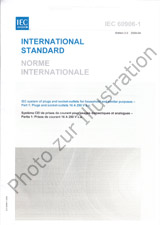Wir benötigen Ihre Einwilligung zur Verwendung der einzelnen Daten, damit Sie unter anderem Informationen zu Ihren Interessen einsehen können. Klicken Sie auf "OK", um Ihre Zustimmung zu erteilen.

IEC/SRD 63520-ed.1.0
Smart cities - Application of IEC SRD 63235 - Concept system building for energy challenge
Name übersetzen
NORM herausgegeben am 15.10.2024
Informationen über die Norm:
Bezeichnung normen: IEC/SRD 63520-ed.1.0
Ausgabedatum normen: 15.10.2024
SKU: NS-1203644
Gewicht ca.: 300 g (0.66 Pfund)
Land: Internationale technische Norm
Kategorie: Technische Normen IEC
Kategorie - ähnliche Normen:
Generalities. Terminology. Standardization. Documentation (Vocabularies)Environmental economics
Die Annotation des Normtextes IEC/SRD 63520-ed.1.0 :
IEC SRD 63520:2024, which is a Systems Reference Deliverable (SRD), provides the concept system of energy challenges in smart cities, using the methodology framework and development processes in IEC SRD 63235. This document is applicable to development and improvement of the terms and concepts relevant to energy challenges in smart cities. As global climate change and energy scarcity become increasingly prominent, it is important that cities and stakeholders proactively address energy challenges to achieve the Sustainable Development Goals. According to the IEC White Paper Coping with the Energy Challenge – The IECs role from 2010 to 2030, cities are facing the following major energy challenges: stabilizing climate impact from fossil fuel use; meeting the energy demands of a growing urban population; bringing electricity to citizens without access; ensuring stable and secure energy access for all cities. Cities are very complex "system of systems", including power grid (energy), industry, buildings, transport, water, waste and other domains, each of which plays an important role. Various domains play an important role in coping with urban energy challenges. On the one hand, not only is it important for the power grid domain to be transformed, but also for industry, buildings, transport and other domains to take proactive measures. Therefore, it is essential for stakeholders in different domains to reach a consensus on energy challenges (including but not limited to the intension, solutions, visions, etc.), which is conducive to improving the pertinency, systematization and effectiveness of the citys response to energy challenges. On the other hand, from the perspective of urban governance, it is not the most effective for each domain to cope with energy challenges independently, and the comprehensive governance capacity of cities to cope with energy challenges can be significantly improved through cross-domain collaboration, interoperability and integration. Semantic interoperability is proposed by the IEC White Paper Semantic Interoperability: challenges in the digital transformation age. Research on semantic interoperability is being carried out or planned in the future in the domains of city, power grid (energy), industry, buildings, transport, etc. For example, in the domain of city, IEC SRD 63476-1 provides a gap analysis of smart city ontology; in the domain of power grid (energy), IEC SRD 63417:–[1] provides guidance and planning for the development of smart energy ontologies. Domain-based ontologies have been developed for semantic interoperability in a specific domain, but there is a lack of cross-domain semantic interoperability research. IEC SRD 63417:– includes the following recommendation: "Start a joint work with IEC SyC Smart Cities and IEC SyC Smart Energy on cross domain ontologies". From the perspective of urban governance, focusing on cross-domain semantic interoperability and at the same time considering the diversity of technology application in rural and remote areas, this document builds a concept system for energy challenges in smart cities, covering core concepts such as intension, stakeholders, solutions and visions of energy challenges. As semantic interoperability research is being carried out or planned in power grid (energy), industry, buildings, transport and other domains, SyC Smart Cities will not be involved in semantic interoperability within these domains. The concept system of this document contains the core concepts of the city domain and the core concepts of cross-domain. The core concepts relevant to energy challenges in other domains, such as power grid (energy), industry, buildings, transport, etc., are developed for semantic interoperability within each domain and fall outside the scope of this document. The purpose of this document includes, but is not limited to: fostering the coordination of perspectives on energy challenges among stakeholders in different domains of city, and helping stakeholders identify the intension, solutions, visions, etc. of energy challenges; providing a basic framework for semantic coherence and standardization of energy challenges in different domains of city, and promoting cross-domain collaboration, interoperability and integration; helping relevant standards development organizations (SDOs) identify gaps in concepts and standards related to energy challenges in smart cities. This document provides a basic framework for cities to adopt top-down, bottom up and federated planning and design, engineering construction, management and operation, standard setting and other measures to effectively respond to energy challenges. This document promotes the collaboration, integration and sustainable development of global smart cities. [1] Under preparation. Stage at the time of publication: IEC SRD CD 63417:2023.
Empfehlungen:
Aktualisierung der technischen Normen
Wollen Sie sich sicher sein, dass Sie nur die gültigen technischen Normen verwenden?
Wir bieten Ihnen eine Lösung, die Ihnen eine Monatsübersicht über die Aktualität der von Ihnen angewandten Normen sicher stellt.
Brauchen Sie mehr Informationen? Sehen Sie sich diese Seite an.



 Cookies
Cookies
